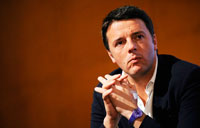Unelected
Despite his reputation as a fresh force out to break up the old structures

Renzi set to become Italy's youngest PM
 |
Although Italy's constitution does not require a prime minister to win a national ballot, opinion polls suggest many Italians are concerned about the lack of a mandate from voters, and questions about how he gained office could limit his ability to push through unpopular reform measures.
The country is only just showing signs of emerging from its longest slump since World War Two, fighting to hold on to a crumbling industrial base and provide jobs for millions of unemployed, many of them young.
Renzi's room for manoeuvre will be tightly constrained by the need to control Italy's 2 trillion-euro public debt, with the euro zone still scarred by memories of the crisis in 2011 which nearly broke the single currency apart.
Padoan, a respected former International Monetary Fund official, will be the fourth technocrat in a row at the economy ministry, the key contact point with the European Central Bank and European Union partners and an important factor in maintaining foreign investor confidence.
As head of the OECD's economics department, Padoan has called for aggressive easing from the European Central Bank and was an early critic of tough budget cutbacks in the euro zone's weakest economies as they struggled with excessive debt.
In other notable changes to the cabinet, NCD leader Angelino Alfano kept his post as interior minister, but will no longer have the title of deputy prime minister after Renzi ruled out giving him a post that could challenge his own authority.
Foreign Minister Emma Bonino, a well-known figure outside Italy, leaves the government to be replaced by Federica Mogherini, a 40-year-old defence and foreign policy specialist in the PD.
A poll on Friday by the SWG polling institute posted a dip in support for the PD, to 29.9 percent from 32.2 percent a week earlier, while support for former prime minister Silvio Berlusconi's Forza Italia rose to 21.8 percent from 20 percent.
The survey showed 27 percent saw Renzi as a leader capable of giving Italy a future, more than any other potential rival on the list. But that vote of support was still outscored by the 30 percent who picked "none".
|
|
|
|
|
|
|
|
